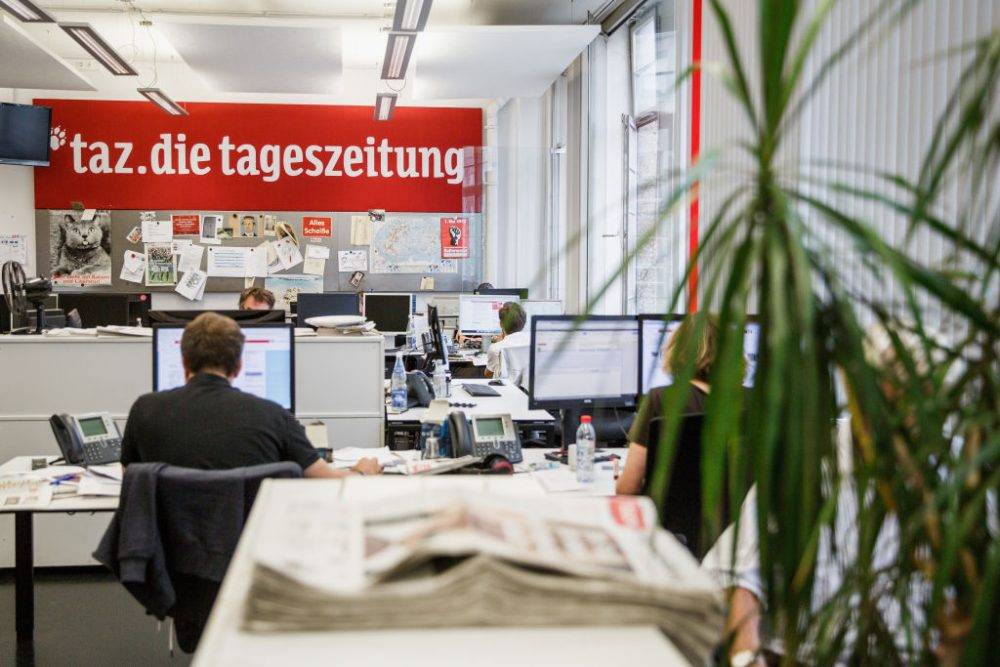
Taz, die tageszeitung, a well-known German daily newspaper that is recognised for its progressive stance on social, political, and environmental issues has been funded and owned by its readers through a cooperative since 1992. (Photo by Carsten Koall/picture alliance via Getty Images)
German President Frank-Walter Steinmeier has assured President Cyril Ramaphosa of his country’s support as South Africa takes over the G20 presidency in 2025. Steinmeier made the remarks during a brief stop in South Africa during his four-day tour to Nigeria and the Kingdom of Lesotho.
South Africa, the first African country to hold the presidency, said it will leverage its presidency at the G20 to “highlight the barriers to AI readiness and opportunities facing developing countries, including unequal, disproportionate access to digital infrastructure”.
How have those disparities played out in a beleaguered African media environment?
In November, the German foreign office invited the Mail & Guardian on a media tour to discuss how Germany has been dealing with disinformation and how African countries, who have been holding elections this year, can better tackle the information surge.
During the visit, hosted by the Goethe Institute, journalists and fact-checkers from Anglophone Africa, who were part of the media tour, expressed the need for African-centered solutions for African issues after a seven-day seminar from different roleplayers.
This was a sentiment shared by colleagues facing media restrictions in Mozambique, Tanzania and Uganda, who acknowledged that first-world Germany was ahead in terms of media resilience.
Mozambique recently faced a media blackout following its elections in October while Uganda and Ghana have been trying to fight the anti-homosexuality act.
The media tour, which included civil society and government representatives, aimed to introduce African media practitioners to how Germany has been dealing with disinformation. The topics surrounded AI, fact-checking, funding, and newsrooms.
The topics, however, were disconnected from the reality faced by the visiting journalists. Africa is a continent with limited access to new technologies and often fails to keep up with the rapid pace of digital advancements.
While AI is on the rise in the West, fact-checking organisation Africa Check confirmed that South Africa’s recent elections have proved that there wasn’t as much false information powered by AI as expected.
This was not the case for German media houses like the Deutsche Welle (DW), a German state-owned international broadcaster that identified a need for a fact-checking desk following the rise of disinformation.
Based on a presentation by the founder of the DW’s fact-checking desk, Joscha Weber, AI has caused media houses in Germany to implement additional measures to cut the supply of disinformation before it reaches the audience.
Germany has several laws and regulations in place to tackle artificial intelligence and reflects both national and European Union frameworks including the General Data Protection Regulation and Cybersecurity Laws to monitor the use of AI and disinformation.
The German Digital Services Coordinator said it has also been actively combating disinformation since it came into effect.
An example of this was a video that trended on social media showing Annalena Baerbock, the German minister of foreign affairs, appearing surprised when she arrived in India to find no formal welcome. The video was found to be misleading.
During the 2017 elections, there were concerns that foreign actors, particularly from Russia, were using AI-powered bots to spread disinformation to create division within Germany’s political system.
Since then, Germany has capitalised on the use of watchdogs in the form of organisations, websites and laws to monitor the spread of information. They have begun from the starting point to dismantle disinformation through media literacy organisations like Lie Detectors, who have introduced an education programme in several schools across Europe to promote media resilience against disinformation.
But Germany’s media resilience will be put to the test during the buildup to the elections scheduled for February 2025.
While there is a disconnect between the availability of resources between the Global South and West, African nations can learn from countries like Germany’s ability to tackle disinformation as a shield should the continent catch up, digitally.
While Germany, like many other countries, faces issues of public trust in the media, according to experts who provided input during the tour, Germans contribute financially to its media structures.
Germans pay a mandatory monthly fee of €18.36 known as the Rundfunkbeitrag to fund Germany’s public service broadcasters, which include ARD, ZDF, and Deutschlandradio. Something much like South Africa’s TV licence, but in Germany non-payment of the fee results in serious penalties.
Taz, die tageszeitung, a well-known German daily newspaper that is recognised for its progressive stance on social, political, and environmental issues has been funded and owned by its readers through a cooperative since 1992.
It is difficult to know for certain whether the funding structures indicate citizen trust in the media or a legal obligation. Either way, it has helped their media resilience. Something that African nations could learn from.



